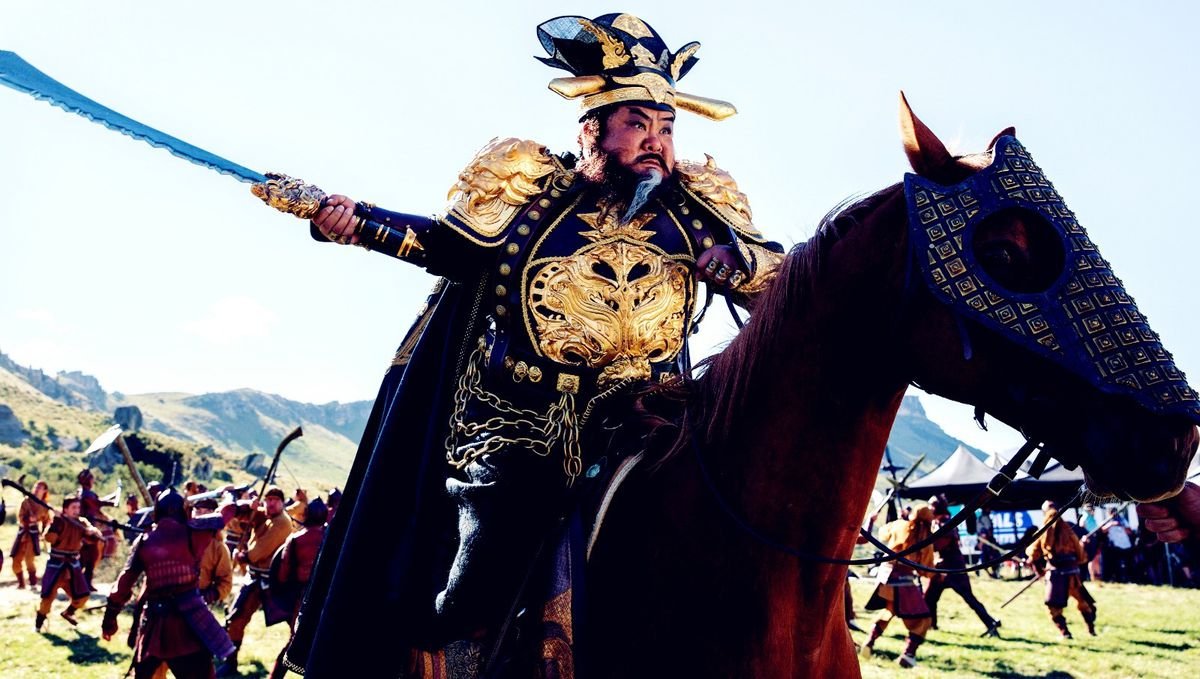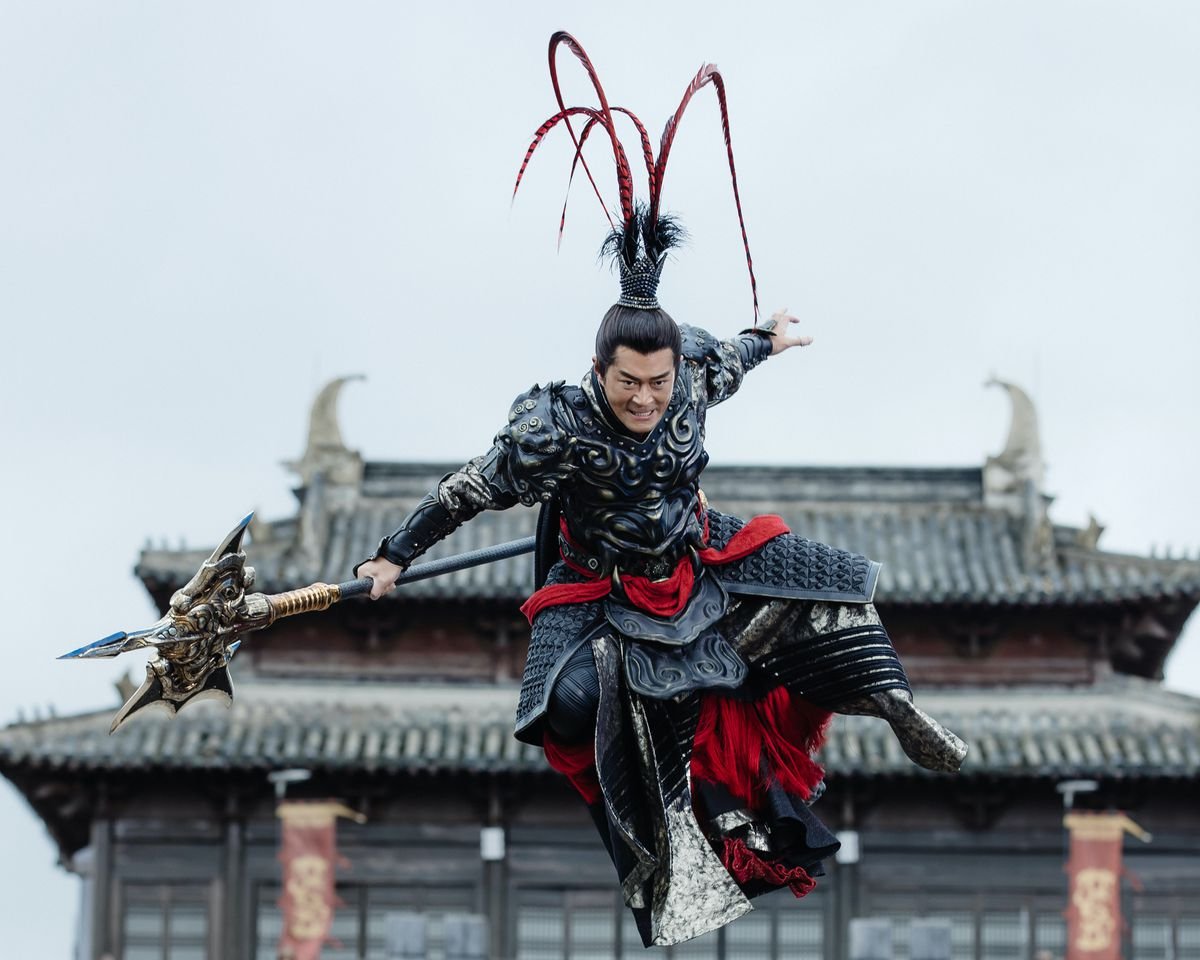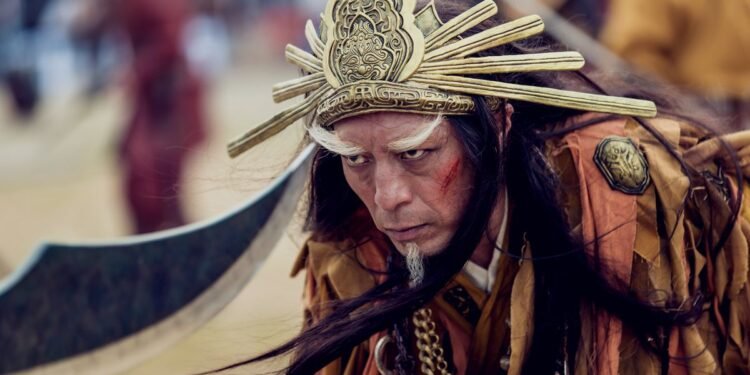Netflix’s Dynasty Warriors movie — like the video game series of the same name on which it’s based — is a complicated thing to review, or to recommend for viewing or avoiding. On the one hand, it’s a perfectly suitable martial-arts action film, when director Roy Hin Yeung Chow focuses on making it into one. The Dynasty Warriors games are based on an old classic piece of Chinese literature, the novel Three Kingdoms, sometimes called Romance of the Three Kingdoms. Viewers who aren’t familiar with either that book or the games may have a hard time following the movie’s plot, which is often a nightmare tangle of sharp turns, out-of-nowhere developments, and important events relegated to a few lines of dialogue.
The film has some great moments, but it’s also inconsistent about them. Dynasty Warriors has a bit of an identity crisis: Roy seemingly can’t decide whether he wants to make a historical period drama that just happens to have some high-octane fighty bits, or a wu xia film that features long swathes of historical drama between a relatively small number of fight scenes. Add the movie’s erratic approach to the chronological flow of the plot, and it’s a recipe for some very divisive opinions.
The movie ends with the phrase “The story of the Three Kingdoms commences,” and that’s a good encapsulation of the story’s scope. The two largest conflicts covered in the film — the Yellow Turban rebellion and the siege of Hu Lao Gate — are, in the novel, the gateway to the book’s eventual focus on the titular three kingdoms vying for control of China. Hu Lao in particular sets the stage for the rulers of those kingdoms (Liu Bei, Cao Cao, and Sun Jian) to rise to power in their own spheres.

Photo: Netflix
That’s why these two battles are often the first two playable stages of a Dynasty Warriors game as well: They’re effectively the prologue, the impetus of the story. Other film adaptations of Three Kingdoms have also taken this approach: John Woo’s two-part Red Cliff is a pair of films devoted entirely to one battle from the novel, albeit a historically critical battle that takes up numerous chapters, and is in many ways the climax of Three Kingdoms.
Dynasty Warriors definitely has a lot of the things common to the wu xia genre that make it enjoyable. Lush exterior shots showing off incredible countryside vistas (from New Zealand, in this case) are a martial-arts film staple, and there are plenty of those here, used to good effect in many of the smaller outdoor scenes. As is often the case, the wide vistas are used to give a sense of grandness and scale to the story, often by contrast with the characters’ smallness in any given shot.
The fight scenes are kinetic. Owing to the high-impact martial-arts action gameplay of the actual games, fight scenes involving the movie’s central characters combine typical wire-work combat with sweeps of scarlet flame in the path of a sword, or a halberd that craters the ground on impact, while bleeding white lightning into the surrounding area. These fights are nonsense, especially the final, climatic battle, where Liu Bei and his brothers face Lu Bu. But they’re nonsense in the best possible way. They’re enjoyable the same way the actual Dynasty Warriors games are enjoyable: over-the-top and stylish, with dramatic visual flair. There just aren’t very many of those fights in the film, which is confusing, given the genre.
The music is the same: A handful of songs from the actual games make their way into the score, typically during fight scenes, and Roy skillfully employs the Dynasty Warriors series’ usual mix of traditional Chinese melodies with hard-rock guitar. At the film’s climax, the series’ main theme plays in all its glory behind the hyperkinetic wire-fu, and it’s a perfect fit.
For fans and readers of the actual novel, there are plenty of “Hey, I remember that!” moments in the plot as well. Guan Yu riding off to kill an enemy general before his wine gets cold, Cao Cao claiming himself and Liu Bei are the only heroes in the land over tea in a thunderstorm, Liu Bei’s ouster as a provincial governor… these are all narrative beats from Three Kingdoms that are typically too specific and incidental to make it into an actual Dynasty Warriors game. At the same time, though, the story takes an equal number of liberties with the novel, sending familiar elements or events in a sharply different direction.

Photo: Netflix
In a way, this characterizes the film’s crisis of identity. Is it adapting the games, or the book? Is it a war story like the games, or a character portrait of the differences between Cao Cao and Liu Bei, as the book often is? By attempting to do both, Roy only partially succeeds in each case. He focuses a tremendous amount of time in the movie on very small events in the story, like Cao Cao’s assassination attempt on Dong Zhuo and the resulting fallout, but then reduces equally critical parts of the story to “and then this happened” dialogue a scene later.
Poor Sun Jian, a major player in Three Kingdoms, gets two screen appearances and then is relegated to being mentioned by other people for the final hour of the movie. Diao Chan, the central figure in the downfall of the film’s main antagonist, Lu Bu, literally just appears while attempting to drown herself in some random mountain lake half an hour before the end of the film.
This may just be the curse of adapting a work with such an immense cast. There’s a reason Red Cliff is two separate full-length features. Dynasty Warriors’ oddly abrupt ending is likely a result of that same curse: When your story is actually the brief prologue to the plot of a 1200-page novel, how do you end it in a narratively satisfying way without foreclosing the novel’s story? Roy’s choices don’t entirely work, but it’s hard to imagine a solution that would.
Adapting the games gives Roy license to go a little harder on the story’s fantasy and supernatural elements, but the film takes that liberty in a strange direction. One of its narrative conceits is a set of magical weapons found in a mystical “Sword Castle,” and given to warriors of great worth so they may change history. The powers of these weapons — which Liu Bei and his brothers, Cao Cao, and Lu Bu all have — are part of the narrative “explanation” for why scenes like the final conflict with Lu Bu would be at home in a Dragonball Z episode.
It’s a reasonable gimmick, and an excuse to give the characters their signature weapons from the Dynasty Warriors games as props, but it also feels deeply unnecessary. Few martial-arts film fans would bat an eye at Guan Yu’s guandao sweeping fire across the battlefield, even without a fancy sword backstory. In fact, he does this very thing in the film even before receiving his magical destiny weapon. Part of the fun of the actual Dynasty Warriors games is that the playable generals are all basically one-person mass-murder engines, scything through faceless mooks like so much wheat. Tacking on a magical castle with a mystical caretaker accessed through a foggy haunted forest ends up feeling really extraneous.
Viewers who have never read Three Kingdoms or played a Dynasty Warriors title can probably still enjoy the film, if they can adjust to the plot’s weird jumps through time and events, and just focus on the drama and visuals. Devoid of any context, it’s still a reasonable martial-arts movie with some over-the-top flair in its big fight scenes.
For folks who know the source material, though, it’s more of a gamble. The little references and inclusions are a plus, like seeing playable characters from the games wearing their actual in-game weapons and armor. But it’s equally likely that knowledgeable fans might feel deep frustration at how scattershot the film is about what Roy and his team choose to include or adapt.
It’s worth wondering whether this adaptation will continue in the future. There’s certainly a lot more story to tackle, even just mining the games rather than the full Three Kingdoms novel. But any future Dynasty Warrior movies could benefit immensely from the creators committing more specifically either to making a historical epic or to making an over-the-top action movie. As a saying oft-quoted in Three Kingdoms observes: “The hunter who chases two hares catches neither.”
Dynasty Warriors is now streaming on Netflix.

Photo: Netflix















































